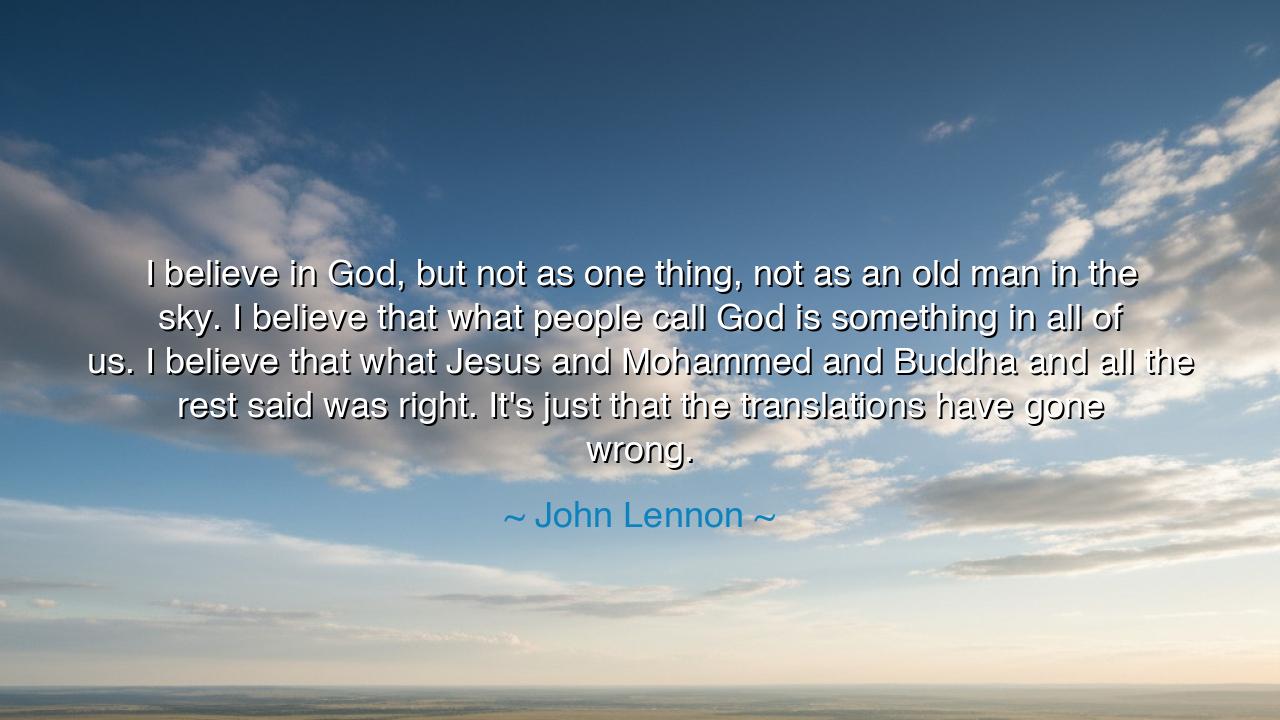
I believe in God, but not as one thing, not as an old man in the
I believe in God, but not as one thing, not as an old man in the sky. I believe that what people call God is something in all of us. I believe that what Jesus and Mohammed and Buddha and all the rest said was right. It's just that the translations have gone wrong.






"I believe in God, but not as one thing, not as an old man in the sky. I believe that what people call God is something in all of us. I believe that what Jesus, Mohammed, Buddha, and all the rest said was right. It's just that the translations have gone wrong." — John Lennon’s words reflect a vision of God that transcends the traditional images, calling for a deeper, more profound understanding of the Divine that is within every individual. His belief that God is not a distant, anthropomorphic figure sitting in the heavens, but an all-encompassing presence within the hearts of all people, echoes the ancient wisdom that the Divine is not separate from us, but interwoven into the fabric of our very existence. Lennon’s perspective asks us to look beyond the outward representations of the sacred and to seek the truth of the Divine within the depth of our own souls.
In ancient spiritual traditions, there was always the recognition that God — or the Divine — is not confined to any one form, concept, or image. The ancient Greek philosophers such as Heraclitus spoke of the Logos, a divine principle that underlies all creation, a truth that exists in everything and is accessible to those who seek it. The Upanishads of India express a similar truth: that the Atman (the true self) is one with the Brahman (the supreme reality), and that the Divine is not a distant entity, but something that resides within every living being. Lennon’s belief mirrors these ancient teachings — that God is not an external figure, but an inherent presence that connects all of us.
The prophets and mystics of various religions, such as Jesus Christ, Mohammed, and Buddha, all sought to point humanity toward a higher truth. They were not establishing new religions, but sharing universal teachings that transcended cultural and temporal boundaries. The Gospel of Jesus Christ calls us to love one another, to seek the kingdom of heaven within us, and to recognize that the Divine is in the very actions of loving, forgiving, and serving. Buddha taught of the nature of suffering and the path to enlightenment, not as an external goal but as an internal realization of peace and awakened consciousness. Mohammed emphasized the oneness of all creation and the importance of aligning oneself with the will of God, a divine truth that resides within the heart of each person.
However, as Lennon wisely observes, the translations of these messages over time have often been distorted, both by human error and by the ways in which institutions have sought to control or monopolize spiritual understanding. In every era, the truths of the mystics and prophets have been wrapped in the garbs of cultural, historical, and political forces, obscuring their universal message. The core teachings of love, compassion, and unity that these great figures imparted have often been reduced to doctrines and rituals that serve the interests of the few, rather than the truth for all. Lennon’s call is not one to abandon religion but to reclaim the essence of these teachings — to see past the outer trappings and to recognize the universal truth that connects us all.
Consider the life of Mahatma Gandhi, a man who embraced the teachings of Jesus, Buddha, and Mohammed, seeing in them a profound unity. Gandhi’s philosophy of non-violence (ahimsa) was rooted in the idea that the Divine resides in every human being, and that we must see God in others to truly know God ourselves. He understood that the essence of all great spiritual teachings is love and truth, and that these principles are meant to guide us toward a unified humanity, not separate us into conflicting factions. Gandhi’s life was a living testimony to Lennon’s belief — that God is not confined to any one religion or tradition, but is within us all, waiting to be recognized and honored.
The lesson here is both liberating and profound: God is not distant or removed, but is the very essence of life, residing within each of us. To seek God is not to look outward to a far-off throne, but to turn inward and recognize the divine presence that is already within. As Lennon suggests, the wisdom shared by the great teachers of humanity is meant not to divide us, but to unite us in a shared vision of love, peace, and spiritual awakening. To know God is to know ourselves, and to see God in others is to see the world as it truly is — a place of unity, where we are all reflections of the same divine light.
Therefore, let us live in the understanding that spirituality is not about following rigid dogmas or external symbols, but about living in alignment with the divine truth that is within us. Let us seek to honor the wisdom of all the great spiritual leaders, not through the lens of separation, but through the lens of unity. Let us pray to recognize God in every person, in every action of kindness, and in every moment of peace. By doing so, we not only deepen our understanding of the Divine, but we also manifest that Divine love in the world, and through that, we fulfill the purpose that connects us all.






AAdministratorAdministrator
Welcome, honored guests. Please leave a comment, we will respond soon